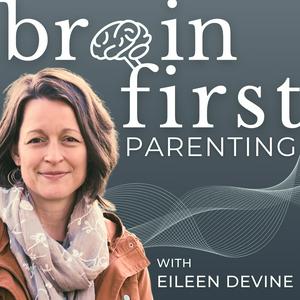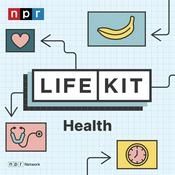34 episodes
- SUMMARY - In this episode of the Brain First Parenting podcast, Eileen explores the idea - which is grounded in research - that caregiver burnout can become contagious through shared nervous system dysregulation. Drawing on a recent keynote experience with those in professional and personal caregiver roles, she describes how caregiver burnout often builds gradually, frequently goes unrecognized, and how the right kind of support can act as a buffer from the stress.
TAKEAWAYS:
Caregiver burnout is not a personal failure. It is a nervous system response to prolonged stress and responsibility.
Burnout can have a contagion effect, spreading socially, emotionally, and physiologically within families, communities, and care teams.
Many caregivers are deeply burned out without realizing it, often experiencing anxiety, depression, irritability, and physical symptoms.
Living with or caring for someone with a fragile nervous system can dysregulate the caregiver’s own nervous system over time.
Connection and co-regulation are essential resilience-building tools that help heal and stabilize the nervous system.
Support matters—but how and where you receive support matters just as much.
Communities that focus only on how hard things are can increase burnout; healing support helps move caregivers toward relief, regulation, and hope.
RESOURCES:
Resilience Room Membership Community is a supportive space for caregivers focused on nervous system healing, co-regulation, and resilience building. Join the waitlist so you can be notified when we open our doors for new Members!
=======================
If you appreciated this episode, and would like to receive a weekly note from Eileen about the Brain First Parenting journey every Monday, you can subscribe to her free newsletter HERE!
You can also check out all the FREE resources Eileen offers for parents, and learn more about all things Brain First at her website: eileendevine.com
And of course, find and follow Eileen on social media:
Facebook
Instagram
Pinterest - SUMMARY - In this episode, Eileen outlines in detail what attention and working memory skills are exactly, and seven signs that may indicate a child struggles with this cognitive skill set.
TAKEAWAYS:
Attention and working memory refers to the ability to selectively process information and then also retain this information in an accessible state.
There are behaviors that reflect lagging attention and working memory skills and this episode provides seven common behaviors for parents and professionals to be aware of.
Recognizing the signs and symptoms of lagging attention and working memory skills is essential in order to provide a child/teen with the accommodations they need to be successful.
RESOURCES:
Brain First Parenting Podcast, Episode 5: Making Sense of Those Frustrating On and Off Days
=======================
If you appreciated this episode, and would like to receive a weekly note from Eileen about the Brain First Parenting journey every Monday, you can subscribe to her free newsletter HERE!
You can also check out all the FREE resources Eileen offers for parents, and learn more about all things Brain First at her website: eileendevine.com
And of course, find and follow Eileen on social media:
Facebook
Instagram
Pinterest - SUMMARY - In this episode, Eileen discussed a topic that is at the center of stress for many parents of kids with neurobehavioral conditions which is their extended family's inability to understand their child from a Brain First lens. Eileen offers some suggestions on ways to manage this specific, often tricky dynamic.
TAKEAWAYS:
It is a common experience amongst parents of kids with neurobehavioral conditions to experience feelings of judgement, shame, and being misunderstood when it comes to their extended family members' inability to see their child through a Brain First lens.
Often times, family members are missing information that is needed in order to shift their lens.
There are resources and strategies Eileen suggests in this episode to help bridge this gap (resources are also listed below).
There are common internal beliefs that parents hold that prevent them from asking for the accommodations their child needs. Reflecting on what "stuck points" you experience when asking family members to accommodate your child is essential so you can confidently move forward with what your child needs.
RESOURCES:
(Blog Post) Dear Family Member: A Letter I Hope You Read
(Free Downloadable Infographic) Your Lens Matters: Shifting to a Brain First Lens
Episode 6: Your Child is Not the Problem
Episode 22: The Unique Grief Affecting Parents of Neurodivergent Kids
=======================
If you appreciated this episode, and would like to receive a weekly note from Eileen about the Brain First Parenting journey every Monday, you can subscribe to her free newsletter HERE!
You can also check out all the FREE resources Eileen offers for parents, and learn more about all things Brain First at her website: eileendevine.com
And of course, find and follow Eileen on social media:
Facebook
Instagram
Pinterest - SUMMARY - In this episode, Eileen sits down to speak with Carrie Bonnett, Executive Function Coach, to talk about what exactly executive function skills are and how parents can identify, through their child's behavior, whether this is a skill set they struggle with and from there, how to support them in this area.
TAKEAWAYS:
Carrie defines executive function in a very relatable way, as the brain skills that help us "get important things done".
Difficulty with executive function skills is a brain thing, not a character flaw, and we can see this lagging skills reflected through one's behaviors.
Why parents play a integral role in helping their child find strategies that will help them manage the executive function load they carry each day and how this partnership with their child can play out in "every day life".
Relationship between a parent and child is the foundational piece to a child being able to feel more open to help and strategies that will support their executive function skills.
At times this means a parent temporarily setting aside or adjusting expectations so that they can, over time, be more open to support.
RESOURCES:
Carrie Bonnett - Executive Function Coach (website)
Carrie's FREE Resource: Task Initiation Toolkit
=======================
If you appreciated this episode, and would like to receive a weekly note from Eileen about the Brain First Parenting journey every Monday, you can subscribe to her free newsletter HERE!
You can also check out all the FREE resources Eileen offers for parents, and learn more about all things Brain First at her website: eileendevine.com
And of course, find and follow Eileen on social media:
Facebook
Instagram
Pinterest - SUMMARY - This episode is part 2 of a two-part series on each person's unique window of tolerance. This episode focuses on the parent's window of tolerance, an essential concept for parents of kids with neurobehavioral conditions.
TAKEAWAYS:
It is essential for parents of complex kids with fragile nervous systems and big behaviors to understand their own window of tolerance.
It is a common pattern for parents of kids with neurobehavioral conditions to notice their window of tolerance narrowing over time.
When a person is exposed to chronic, unpredictable, and prolonged stress, it impacts their neurobiology, specifically their nervous system.
The nervous system becomes more fragile over time, the window of tolerance narrows, and it is easy to be thrown into dysregulation
The best use of a parent's energy is to support their fragile nervous system by using their own regulated presence. This requires a strong and steady nervous system.
The path to expanding your window of tolerance is taking steps to build resilience each day.
RESOURCES:
Episode 28: When the World Feels Too Big: Your Child’s Window of Tolerance
Episode 19: Rethinking What It Means to Be Resilient
Blog: Understanding the Window of Tolerance - Pt. 2
Book Recommendation: "What Happened to You? Conversations on Trauma, Resilience, and Healing" by Dr. Bruce Perry and Oprah Winfrey
=======================
If you appreciated this episode, and would like to receive a weekly note from Eileen about the Brain First Parenting journey every Monday, you can subscribe to her free newsletter HERE!
You can also check out all the FREE resources Eileen offers for parents, and learn more about all things Brain First at her website: eileendevine.com
And of course, find and follow Eileen on social media:
Facebook
Instagram
Pinterest
More Health & Wellness podcasts
Trending Health & Wellness podcasts
About Brain First Parenting with Eileen Devine
The Brain First Parenting podcast supports parents who are raising children, teens or young adults with brain-based differences and challenging behavioral symptoms. We are a safe space for parents who have historically felt like there isn't a place for them in the parenting advice world. At Brain First Parenting, we see each child as a unique individual with a unique brain, who deserves accommodations to thrive in a world that is frequently not set up for people with neurobehavioral challenges. We prioritize supporting the parents of these kids and teens so that they can, in turn, feel hope and confidence and joy in their parenting experience.
Podcast websiteListen to Brain First Parenting with Eileen Devine, The Wellness Scoop and many other podcasts from around the world with the radio.net app

Get the free radio.net app
- Stations and podcasts to bookmark
- Stream via Wi-Fi or Bluetooth
- Supports Carplay & Android Auto
- Many other app features
Get the free radio.net app
- Stations and podcasts to bookmark
- Stream via Wi-Fi or Bluetooth
- Supports Carplay & Android Auto
- Many other app features


Brain First Parenting with Eileen Devine
Scan code,
download the app,
start listening.
download the app,
start listening.







































